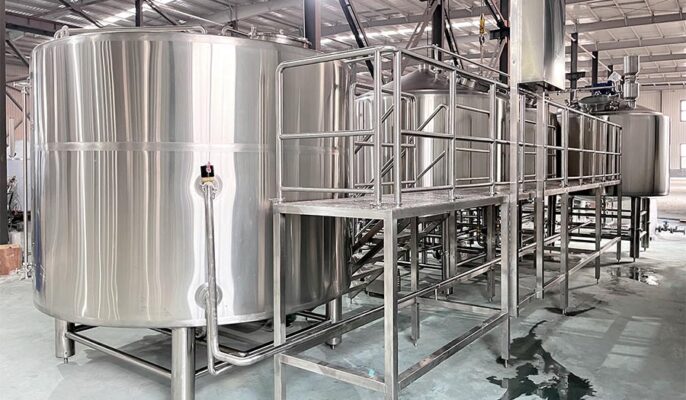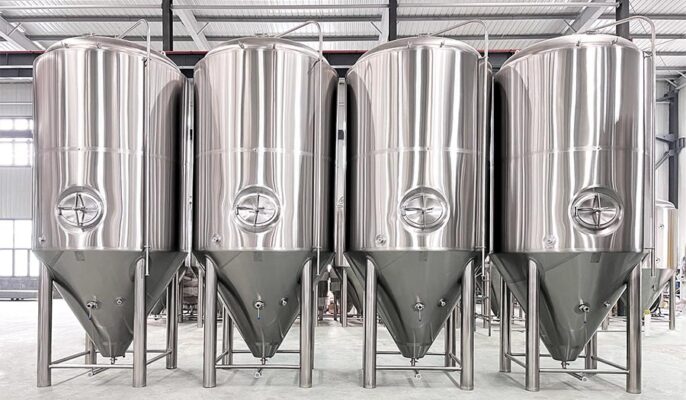Starting a commercial brewery requires an array of equipment to handle the various stages of the brewing process. There are several factors to consider when purchasing major equipment for your brewery. In this article, we’ll look at the basic parts you’ll need and discuss the various options involved.
What is commercial brewing equipment?
Commercial brewery equipment is specialized equipment and machinery used for commercial beer production. It includes important components designed to help the brewing process, maintain quality control, and maximize efficiency. From commercial brewery equipment to fermentation vessels, every component plays a vital role in the production of high-quality beer.
Commercial brewing process
- Milling: The process begins with milling, and crushing the sprouted grains to open up the starch within them. The consistency of the grind affects the efficiency of mashing.
- Mashing: In a mashing barrel, ground grains are mixed with water at a specific temperature to convert starch into fermentable sugars. This step creates a sweet wort that is the basis for all beer flavors.
- Boil and hop: Transfer the wort to a brewing kettle and boil, adding hops to impart bitterness and aroma. This is a critical step in defining the characteristics of the beer.
- Fermentation: After boiling, the wort is cooled and transferred to a fermentatietank. Yeast is introduced to convert sugar into alcohol and carbon dioxide, thus forming beer.
- Conditioning and Filtration: Once fermentation is complete, the beer will enter the conditioning stage to further develop flavor. Filtration removes any impurities, leaving a clear and stable product.

Commerciële brouwapparatuur Kenmerken
- Mashing: Mashing equipment is the process of mixing grains (ground grains) with hot water to extract sugar from the grains. This process usually takes place in the mash tun. The temperature of the mash tun can be controlled to allow for the different enzymatic reactions required to break down the grain’s carbohydrates into fermentable sugars.
- Filtration: The filtration process is carried out in the filter barrel. This is the process of separating spent grains from liquid wort. The wort, which contains the sugars needed for fermentation, is then transferred to the brewing kettle.
- Boil and hops: Brewing kettles are used for the boiling process where hops are added to add bitterness, flavor, and aroma. Boil the wort to sterilize it and remove any unwanted flavors.
- Cooling: After boiling, the wort must be cooled to a temperature suitable for yeast fermentation. This process uses a heat exchanger, which cools the wort without the risk of contamination.
- Fermentation: The cooled wort is transferred to a fermentation vessel and yeast is added to it. Yeast consumes the sugar in the wort, producing alcohol, carbon dioxide, and various flavors. The temperature control system ensures that the fermentation process takes place at the optimal temperature for the yeast strain used.
- Maturation: After initial fermentation, the beer is usually transferred to conditioning or maturation tanks, where it continues to develop flavor over weeks or months.
- Filtering and Carbonation: Beer can be filtered to remove any remaining solids and carbonation can be added if necessary.
- Packaging: The final step in the process is packaging the beer into bottles, cans, kegs, or other containers for distribution and sale.
Commercial Brewery Needs Equipment Checklist
Brouwerij
You won’t get very far without the equipment to brew beer. Once you have the ingredients you need, like grains, yeast, hops, and anything else you add to your beer, it needs to go somewhere to start the brewing process. This is a critical piece of equipment needed to mass-produce beer and distribute it.
Malthouse
Grinding the grains you choose to use in your beer is the first step in brewing. A malt mill is a piece of equipment that can grind large amounts of grain at once. Considering you’re likely going to be consuming a lot of grains, you want something reliable that lasts a long time and goes through many batches. You don’t want the mill to grind the grain into particles that are too fine, as this will cause your mash to clump and stick to the mash tub, causing more problems later.
Mashketel
The mash tun has temperature control and allows you to mix the grains with water to produce the desired mash. The mash tun also heats the mixture, which helps break down the starches in the grains and convert them into the sugars needed to make the beer alcoholic.
Hydrothermal tank
Thermal tanks store and heat the water used in the brewing process. It provides hot water for mashing, sparging, and cleaning.
Wortkoeler
After boiling, the wort needs to be quickly cooled to a temperature suitable for fermentation. Wort coolers, usually in the form of plate or shell and tube heat exchangers, help achieve this by transferring heat from the hot wort to the cold water.
Vergister
When you’ve fully brewed your beer and added the basic ingredients, the next step is to transfer it to a fermenter, sometimes called a single tank, depending on the style. Commercial breweries require quite a few breweries, and they need to be larger to accommodate the large volumes of beer you want to produce. This is where you add yeast and turn the wort into real beer. Fermenters are carefully controlled environments that help yeast convert sugar into alcohol.
Britse tank
Once fermentation is complete, you’ll need a place to store it. For smaller operations, you can technically store your beer in a fermentation tank. However, commercial breweries need to immediately release these fermenters to produce new batches of beer so the beer can be transferred to beer tanks for storage. Brite tanks are not just for storage, though, as the environment in a Brite tank helps ferment beer carbonate faster so it can be packaged and consumed more quickly.
Heat source
There are three types of heating systems:
- Stoomverwarming
- Elektrische verwarming
- Heating by direct fire
If the budget is limited and the brewing system capacity is less than 1000L, electric heating is the best choice. But, if a brewing system exceeding 1000L requires power support, besides to the higher electricity costs for daily operation, more funds may be required to install the power requirements for brewhouse operation.
Filtratie apparatuur
Between the different tanks you have throughout your brewery, you need to have the right technology in place to filter your beer as it’s being brewed. One of the key reasons you need to take filtration is that it removes yeast and other solids from your beer. While not all these substances are inedible or will spoil the product, if not removed early, they may affect the taste in ways you don’t want or cause the product to spoil faster.
Carboneerapparatuur
Carbonation equipment is used to add carbon dioxide to beer to bring it to the desired level of carbonation. This can be done with a carbonator or carbonation tank, which dissolves carbon dioxide into the beer under controlled pressure.
Schoonmaakspullen
Maintaining cleanliness and hygiene is essential for brewing. CIP systems allow breweries to clean and sanitize beer equipment without disassembling it. It involves circulating cleaning solutions and disinfectants through the various components of the brewing system.
Filling system
Whether you use cans or bottles, you need a filling machine. There are many different types to choose from. Especially with bottlers, you need to know whether you want to package carbonated beer or rely on bottle conditioning for carbonation. If you plan to package carbonated beer, you will need an isobaric (counterpressure) bottling or canning line.

How to choose your commercial brewery equipment?
Choosing the right commercial brewing equipment is a major decision that can have a profound impact on the efficiency of your brewing operation, the quality of your beer, and ultimately the success of your business.
Capaciteit
Your equipment should meet your brewing needs in terms of output. Consider your current needs, but also keep future growth in mind. If you plan to expand your business, you may want to choose a system with higher capacity to accommodate this growth. The YoLong team can help you design your commercial brewing equipment layout.
Kwaliteit
The quality of your equipment will affect the quality of your beer. High-quality equipment lasts longer, performs better, and may save you money on maintenance and repairs in the long run. Check the quality of materials used, workmanship, and the reputation of the manufacturer.
Functie
Different brewing systems offer different features and levels of automation. Some brewers may prefer to practice using a manual system, while others may choose a more automated system to streamline the brewing process and increase consistency.
Flexibiliteit
Some systems are designed to be versatile, allowing you to brew various styles of beer without the need for extra equipment. If you plan to produce a variety of beers, look for a system that offers this flexibility.
Benodigde ruimte
Consider the size of your brewing equipment and the space available in your facility. Ensure system comfort and efficient workflow.
Budget
Cost is an important factor, but it shouldn’t be the only one. In the long run, cheap equipment can end up costing you more if it doesn’t perform or requires frequent repairs. Always consider the value the equipment provides quality, functionality, and potential return on investment.
Service na verkoop
Look for suppliers that offer good after-sales service, including installation, maintenance, repairs, and spare parts supply. This support is invaluable in keeping your operations running .
Reputatie van leveranciers
Choose a supplier with a good reputation within the industry. Look for reviews or ask for references to make sure they are reliable and provide high-quality equipment and service. With a strong focus on quality and customer service, MICET has developed a reputation as a reliable brewing equipment supplier.




